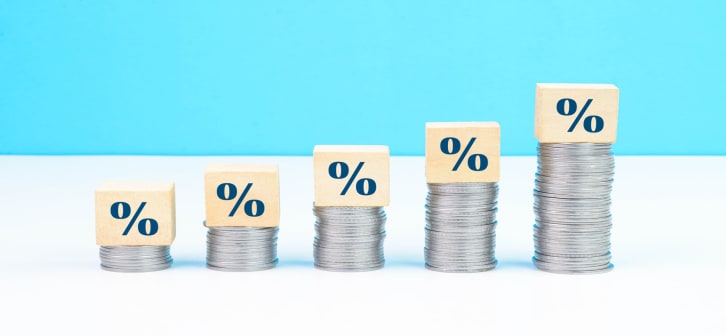Average Student Loan Interest Rates
Editor & Writer
Editor & Writer
Editor & Writer
Editor & Writer

Data Summary
-
The current federal student loan interest rate for undergraduates is 5.50%.[1] -
Unsubsidized and direct PLUS loans for graduate and professional students have fixed interest rates of 7.05% and 8.05%, respectively. -
Private student loan fixed interest rates are typically around 4.4-16.2%. -
Variable interest rates can start as low as 5.6%. Throughout the loan, they can reach 20-30% or more. -
Private lenders typically offer student loan refinancing interest rates between 4.9-12.2%. -
In recent history, the highest federal student loan interest rate for undergraduates was 6.8% in 2006. The lowest was 2.75% in 2020.Note Reference [1] -
In 2023-2024, federal graduate student loan interest rates are the highest they have ever been.Note Reference [1]
Today, U.S. student loan debt is close to $1.77 trillion. More Americans are in debt to pay for school than ever before.
If you're one of the 3 in 10 adults who have borrowed money to pay for college, you're probably familiar with how interest increases the amount you owe. Borrowers must pay interest — a certain percentage of the loan — on top of the borrowed amount.
This report lists current student loan rates, average interest rate ranges, and student loan refinance rates. It also answers some commonly asked questions about student loan interest rates, so you can better plan how to make your college education more affordable.
Table of Contents
Current Student Loan Interest Rates
Federal and private student loans may charge interest differently. Federal loans always charge a fixed interest rate, meaning it never changes over the loan term. Private student loans may offer fixed or variable rates, meaning the interest rate is subject to change monthly.
Current Federal Student Loan Interest Rates
Federal loans for undergraduates, graduate students, and parents have different interest rates. The Federal Student Aid Office updates interest rates for all federal student loans every July.
| Type of Loan | Interest Rate (Fixed) |
|---|---|
| Undergraduate subsidized and unsubsidized student loans | 5.50% |
| Graduate unsubsidized loans | 7.05% |
| Graduate and parent PLUS loans | 8.05% |
Current Student Loan Interest Rates and COVID-19
At the start of the pandemic, the government enacted a 0% interest rate on federal student loan debt and paused student loan repayment through August 2022. The figures above reflect interest rates outside of that period.
Student loan payments — and interest — are scheduled to resume in September 2023.
Private Loan Interest Rates
Private loan interest rates vary by lender and borrower. Lenders quote you an interest rate based on your credit history and other factors.
Among our top private loans for 2022, the average fixed interest rate ranges from 4.8-12%. The average variable private student loan interest rate starts at 5.9-15% (though the interest rate will change over the life of the loan).
| Lender | Fixed Interest Rates | Starting Variable Interest Rates | Variable Interest Rate Cap |
|---|---|---|---|
| Citizens Bank | 4.43-12.86% | 5.98-14.05% | 21% |
| Earnest | 4.68-16.15% | 5.64-16.45% | 36% |
| LendKey | 4.89-11.26% | 6.03-12.13% | 18%2 |
| Massachusetts Educational Financing Authority (MEFA) | 5.35-7.95% | No variable rates offered | N/A |
| Rhode Island Student Loan Authority (RISLA) | 4.45-8.99% | No variable rates offered | N/A |
| Sallie Mae | 4.5-15.49% | 6.12-16.45% | Not listed |
Student Loan Refinance Rates
Borrowers may choose to refinance student loans with another lender to get a lower interest rate. Refinance rates vary from lender to lender. Student loan refinance rates also depend on the borrower's credit history and the new loan's term length.
Out of a sample of six private lenders, average fixed student loan refinance rates range from 5.3-9.1%. Average variable student loan refinance rates start between 5.6-8.9%.
Below, find rate ranges from private lenders who offer student loan refinancing.
| Lender | Fixed Interest Rates | Starting Variable Interest Rates |
|---|---|---|
| Citizens Bank | 6.8-10.99% | 6.83-12.17% |
| Earnest | 5.21-9.24% | 5.57-9.19% |
| LendKey | 5.24-10.68% | 5.27-8.18% |
| MEFA | 5.5-8.45% | No variable rates offered |
| RISLA | 5.79-8.24% | No variable rates offered |
| SoFi | 4.9-8.99% | 5.99-9.24% |
Student Loan Fees
Many lenders charge borrowers fees associated with student loans. These might include a loan application fee, processing fees, or a late fee for failing to make payments on time.
Current Federal Student Loan Fee
Federal loans charge borrowers a fee at disbursement — i.e., when they release funds. Disbursements typically occur once every semester or quarter.
| Loan Type | Fee |
|---|---|
| Undergraduate Subsidized and Unsubsidized Loans | 1.057% |
| Graduate Unsubsidized Loans | 1.057% |
| Graduate and Parent PLUS Loans | 4.228% |
Private Student Loan Fees
Some private lenders charge application, origination, or late payment fees. Some lenders who waive application or origination fees will still charge you for late or returned payments. So, read your loan agreement carefully.
Your loan agreement will also detail which fees you're subject to. These fees may include:
- Application Fee: What it costs to get approved for a loan.
- Origination Fee: A processing fee at the start of your loan term.
- Late Payment Fee: A charge for missing your payment date —typically a percentage of your payment.
- Returned Payment Fee: If the lender can't process your payment due to insufficient funds in your account.
Student Loan Interest Rates by Year
Federal undergraduate student loan interest rates have generally decreased since the 2007-2009 economic recession. The average interest rate over the past 15 years was about 4.7%.
From 2006 to 2013, the interest rates for graduate unsubsidized loans and PLUS loans did not change. They stayed at 6.8% and 7.9%, respectively. The interest rates for these loans began fluctuating in the 2013-2014 academic year.
In 2023-2024, graduate student loan interest rates are the highest they've ever been.
Frequently Asked Questions About Student Loan Interest Rates
What is today's student loan interest rate?
The current federal student loan interest rate is 5.05% for undergraduate student loans. The rate is 7.05% and 8.05% for graduate unsubsidized loans and PLUS loans, respectively.
Today's private student loan interest rates may start from 4.4% on the low end to 16.2% on the high end for fixed rates. Variable rates typically start around 5.6-16.5% and fluctuate over the term of the loan.
What is the average student loan refinance rate?
Among the six lenders we sampled, the average fixed student loan refinance rate is 5.3-9.1%. These lenders' variable refinance rates start between 5.6-8.9%, on average.
What is a good interest rate for a student loan?
Considering the average fixed interest rate among lenders we sampled was around 4.8-12%, a rate on the low end of this range could be considered good. The current federal student loan rate is 5.05% for undergraduates, which is lower than many private loan interest rates.
Federal student loans come with other benefits, which can ease the burden of debt. For example:
- Students don't pay interest on subsidized loans as long as they're in school.
- Federal loans offer more flexible repayment options.
- Borrowers with federal loans may qualify for debt cancellation through Public Service Loan Forgiveness or other programs.
For these reasons, it's generally wise to take full advantage of federal financial aid before turning to private loans.
Why is student loan interest so high?
Student loan interest rates tend to reflect the market. The Federal Reserve recently raised interest rates, including interest rates on federal student loans.[2] This rate hike also influences private lenders' variable rates and rates on new private loans.
Federal loan interest rates are the same for everyone, but private student loans can be higher for some people. In addition to accounting for economic conditions, private student loans also account for the following:
- The Length of the Loan: Longer terms may charge higher interest rates.
- Your Credit History: Better credit can qualify you for a lower interest rate.
- Your Income: Private lenders want to see proof of income so they know you can afford to pay them back. Having a cosigner may help lower your interest rate.
















